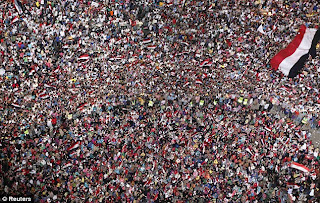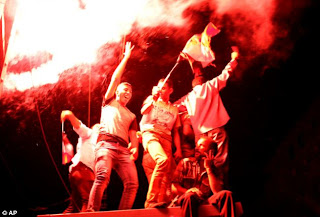Wednesday, 3 July 2013
Egyptian Protest 2013 thousands on the streets.
Shocking images emerge of Egyptian protesters trying to bring down army helicopter as Morsi expected to step down or be sacked by military today
At least 23 killed in overnight clashes in Cairo and 200 more injured
The Al-Ahram newspaper reports that the army could step in today
Anti-Morsi demonstrations have become the largest since the 2011 Arab Spring uprising as they enter the third day of protests
Protesters have been chanting: 'The people demand the fall of the regime'
Deadline set by military for resolution fast approaches before it will intervene
U.S. and UK have urged citizens to cancel travel plans to or within Egypt
Protests caused Egyptian shares to reach three-week high as oil prices soar
Continue Reading..
Egyptian President Mohammed Morsi is expected to either resign or be forced out of his role by the military today, claim the country's media, as images emerge showing protesters trying to bring down an army helicopter.
Violence between anti-Morsi protesters and opposition groups escalated last night with trouble in the capital Cairo seeing at least 23 people killed and 200 injured.
The clashes came hours after the country's military leaders laid down a deadline for President Morsi to find a resolution to Egypt's political crisis or else the army would impose its own political plan.
The army plans to depose Morsi should no solution be reached, suspend the constitution, disband parliament and install a new leadership.
Egypt's Al-Ahram newspaper said the road map would establish a three-member presidential council to be chaired by the head of the Supreme Constitutional Court.
'Al-Ahram learnt that with the end of the 48-hour period set by the armed forces it is expected in the hours that follow it, one of two things: either Morsi announces his resignation himself, or the declaration of his removal through the road map for the future set out by the armed forces,' it said.
But an armed forces spokesman denied the claims and said that the countries leaders would instead be called to crisis talks.
The latest developments came after pictures emerged of protesters shining laser pointers at a military helicopter on Sunday night in an apparent attempt to bring it down.
Most of those killed in overnight violence reportedly died in a single incident of fighting outside Cairo University.Off the back of the violence and civil unrest oil prices have surged to more than $100 (£66) a barrel - a two per cent rise.
The price of oil is currently the highest its been since September 2012.
According to the BBC's Jeremy Bowen, the whole country is in turmoil.
He said that opponents of Morsi have indicated that they are prepared to die for the cause.
He told Radio 4 this morning: ‘I saw young men out on the street brandishing burial shrouds as a sign of their willingness for martyrdom’.
As the clock ticked towards a deadline of 4pm local time (3pm UK time) set by the Egyptian military for an end to the crisis, Mr Cameron told the House of Commons that the administration of president Mohammed Morsi must show it is responsive to the concerns of its citizens.
The Foreign and Commonwealth Office (FCO) is recommending against all but essential travel to most parts of Egypt, following last night's protests.
Mr Cameron assured MPs in the Commons that action was being taken to safeguard UK nationals in Egypt and the British Embassy in Cairo.
He said: 'These are deeply disturbing scenes, the level of violence is appalling.
'We should appeal to all sides to calm and stop the levels of violence, and particularly sexual assaults.'
Mr Cameron added: 'It is not for this country to support any single group or party. What we should support is proper democratic processes and proper government by consent.
'Very clear messages have been sent to president Morsi - including by president Obama who spoke to him directly, and we have also been communicating through our ambassadors - that, yes, he has a democratic mandate and we respect that, but democracy also means ensuring that everyone has a voice and that leaders have a responsibility to represent all Egyptians and show they are responsive to their concerns.
'That's what the government needs to do in order to bring about peace and stability in that country.'
President Mohammed Morsi, who yesterday rebuffed an army ultimatum to force a resolution to Egypt's political crisis, made an emotional speech which was aired live to the nation.
Morsi, who a year ago was inaugurated as Egypt's first freely elected president, pledged to protect his 'constitutional legitimacy' with his life.
He accused loyalists of his ousted autocratic predecessor Hosni Mubarak of exploiting the wave of protests to topple his regime and thwart democracy.
'There is no substitute for legitimacy,' said Morsi, who at times angrily raised his voice, thrust his fist in the air and pounded the podium.
He warned that electoral and constitutional legitimacy 'is the only guarantee against violence.'
Morsi's defiant statement showed that he and his Muslim Brotherhood are prepared to run the risk of challenging the army.
It also entrenches the lines of confrontation between his Islamist supporters and Egyptians angry over what they see as his efforts to impose control by his Muslim Brotherhood and his failures to deal with the country's multiple problems.
The crisis has become a struggle over whether a popular uprising can overturn the verdict of the ballot box.
Morsi's opponents say he has lost his legitimacy through mistakes and power grabs and that their turnout on the streets shows the nation has turned against him.
Nationwide protests against Morsi prompted the army to tell feuding politicians they had 48 hours find a resolution with the opposition or it would impose its own road map for the country.
Neither side showed any signs of backing down however with Morsi arguing he had not been consulted by the military and would pursue his own plans for national reconciliation.
But the Islamist leader looked increasingly isolated with the liberal opposition refusing to talk to him and the armed forces, backed by millions of protesters in the street, giving him until today to agree to share power.
TWO YEARS OF TURMOIL AND TRANSITION: TIMELINE OF EVENTS
Key events from when the Arab Spring began to the current protests:
Jan. 25-Feb. 11, 2011 - Egyptians stage nationwide demonstrations against the rule of autocrat Hosni Mubarak, who led the country for nearly three decades.
The 18-day 'revolution,' launched by secular and leftist youth, draws in a wide spectrum, including the Muslim Brotherhood and other Islamists. Hundreds of protesters are killed as Mubarak and his allies try to crush the uprising.
Feb. 11 - Mubarak steps down and turns power over to the military. Two days later, the body of top generals, the Supreme Council of the Armed Forces, dissolves parliament and suspends the constitution, meeting two key demands of protesters.
June 16-17 - Egyptians vote in the presidential runoff between Morsi and Shafiq. The generals issue a 'constitutional declaration' giving themselves sweeping authorities and limiting the powers of the next president. Morsi emerges as the victor, with 51.7 percent of the vote.
June 30 - Morsi takes his formal oath of office before the Supreme Constitutional Court, a day after reading a symbolic oath in Cairo's Tahrir Square, birthplace of the revolution.
Aug. 12 - In a bold move, Morsi orders the retirement of the top Mubarak-era leadership of the military and cancels the military's last constitutional decree, taking back the powers that the generals gave themselves. The move was seen as way to curb the military's role in political affairs but it also gave Morsi the power to legislate in the absence of parliament.
Nov. 22 - Morsi unilaterally decrees greater authorities for himself, giving his decisions immunity from judicial review and barring the courts from dissolving the constituent assembly and the upper house of parliament. The move came just ahead of court decisions that could have dissolved the bodies. The move sparks days of protests, with clashes between Morsi's supporters and opponents. At one point, some 200,000 people rally in Tahrir Square, with some of the first chants for Morsi to 'leave.'
Dec. 4 - More than 100,000 protesters march on the presidential palace, demanding the cancellation of the referendum and the writing of a new constitution. The next day, Islamists attack a peaceful anti-Morsi sit-in outside the palace, sparking all-out street battles that leave at least 10 dead. Days later, Morsi rescinds his initial decrees, but maintains the date of the referendum.
Jan. 25, 2013 - Hundreds of thousands hold protests in Tahrir Square and nationwide against Morsi on the 2-year anniversary of the start of the revolt against Mubarak, and clashes erupt in many places.
Jan. 26 - Residents of the city of Port Said stage protests, angered by a court ruling convicting and sentencing to death a group of local soccer fans for a 2012 stadium riot. Police crack down hard in Port Said, killing more than 40 protesters, and in outrage the city and others nearby go into near revolt. Much of the anger is focused at Morsi, who praised the police for their crackdown.
Feb.-March - Protests continue in Port Said and other cities for weeks, with dozens more dying in clashes, and some police units around the country go on strike. Brotherhood youth and their opponents fight in the streets outside the group's main Cairo headquarters.
June 23 - A mob beats to death four Egyptian Shiites in their home in a village on the edge of Cairo. Morsi condemns the attack, but critics blame virulent anti-Shiite rhetoric by his hard-line Islamist allies, fueled by Syria's civil war. A week earlier, Morsi shared a stage with hard-line clerics at a rally, sitting silently as they denounced Shiites as 'filthy.'
June 30 -- Millions of Egyptians take to the streets in Cairo and other cities calling for Morsi to step down in a massive display of anger and frustration with the Islamist leader. The demonstrations are largely peaceful, although 16 people, half of them in clashes outside the Muslim Brotherhood's Cairo headquarters, are killed in protest-related violence nationwide. Organisers vow to keep up the protests until Morsi resigns.
July 1 - Demonstrations continue and Egypt's military issues an ultimatum for the two sides to come to a resolution within 48 hours or it will impose its own solution.#
July 2 - A night of clashes outside Cairo University sees at least 16 people killed, with unofficial sources saying that more than 23 people died.
July 3 - Egyptian media reports that President Morsi will either be sacked or forced to stand down as the army's deadline for a resolution approaches.
Subscribe to:
Post Comments (Atom)


































0 comments:
Post a Comment